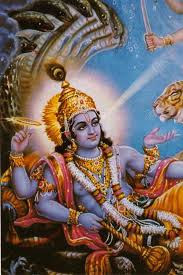Gita : Ch-8. Slo-25. Part-1.
Very important slokam, Lord explains about Rebirth .
Srimad Bhagavad-Gita :
Chapter-8 ( Akshara-brapma-yogam )
Slokam-25. [ The State of Re-birth- ( Punar-avarttanam gati ? ) ]
dhumo ratris tatha krishna san-masa dakshinayanam,
tatra candramasam jyotir yogi prapya nivartate.
dhumah, ratrih, tatha, krishnah; = smoke, night, also, the fortnight of the dark moon;
sat-masah, dakshina-ayanam = the six months, when the sun passes on the southern side;
tatra yogi = through the above path, the yogi who leaves ( discard ) his body and move on to;
candramasam, jyotih = the candralokam, the seat of decay, ( no progress place );
prapya, nivartate = achieves ( the above experience ) and returns ( comes back ).
Part-1.
RE-BIRTH ( PUNAR-AVARTTANAM ) :
The Yogi who passes away from this world during the smoke, the night, the moonlight fortnight, or in the six months when the sun passes to the south, or who reaches the moon planet ( Candralokam ), and later after the experiences again comes back ( returns to this world / samsaram ).
Now Lord Krishna explains the path that leads to a return of rebirth in the material existence. When one accedes to death at the times presided by the demigods identified with smoke, with night, with the waning moon and with the suns waning southern course guided on these paths those who performed ritualistic Vedic activities will reach the celestial heavens and after amply enjoying the fruits of their actions will return again and be reborn in the world of mortals.
The word dhumah meaning smoke indicates the presiding demigod of the path in which lies the Pitru-lokam the realm of the manes or ancestors. The word yogi has been used to denote a spiritual person who performs Vedic activities.
They first reach the demigod identified with smoke, etc. Thus by mediation and performing selfless Vedic activities without desire for rewards one gradually achieves moksa or liberation from material existence and those who perform Vedic activities with a desire for rewards and benefits return to the material worlds after enjoying their accumulated merit in the heavens.
But those who go against the injunctions of the Vedic scriptures and do prohibited activities only return to material worlds after prolonged and agonising suffering in the lower hellish planets when all their demerits have been purged. While ordinary creatures of flora and fauna are reborn again and again incessantly and continuously.
To be continued ...





Comments
Post a Comment